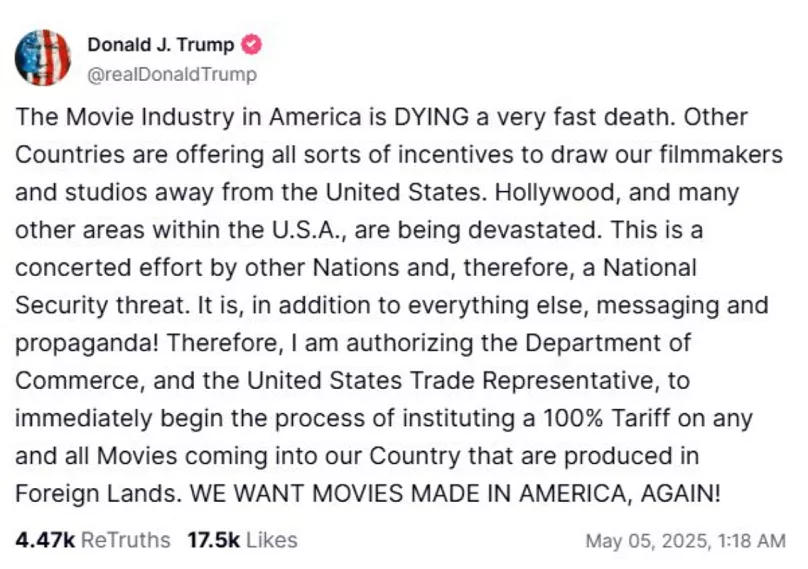President Donald Trump announced on Sunday a plan to impose 100% tariffs on movies produced outside the United States, citing a “national security threat” to the American film industry. The move, detailed in a Truth Social post, aims to curb foreign incentives drawing filmmakers abroad, but it has triggered widespread concern in Hollywood and beyond, with questions about its feasibility and impact rippling across the global entertainment sector.
Trump claimed the U.S. movie industry is “DYING a very fast death” due to other countries offering tax breaks and lower production costs. “Other Countries are offering all sorts of incentives to draw our filmmakers and studios away from the United States,” he wrote, labeling foreign productions a source of “messaging and propaganda.” He directed the Department of Commerce and U.S. Trade Representative to begin implementing the tariffs, stating, “WE WANT MOVIES MADE IN AMERICA, AGAIN!” Commerce Secretary Howard Lutnick responded, “We’re on it,” though no timeline or specifics were provided.
The announcement sent U.S. media stocks tumbling Monday. Netflix shares fell 4.9% to $1,103.76 from $1,156.49, while Walt Disney Co. dropped 3.1% to $89.621, Warner Bros. Discovery declined 3.9% to $8.21, and Comcast, owner of Universal, slipped 0.8% to $34.18, according to market data. “The problem is that pretty much all the studios are moving tons of production overseas to reduce production costs and leverage foreign credits,” said Barton Crockett, an analyst at Rosenblatt Securities. He warned that higher costs could lead studios to produce less content and face retaliatory tariffs on U.S. films abroad.

Hollywood’s reliance on global production has grown, driven by cost savings and exotic locations. Major U.S. films like Deadpool & Wolverine, Wicked, and Gladiator II were shot abroad, while upcoming projects such as Avatar: Fire and Ash (New Zealand) and Avengers: Doomsday (London) continue the trend. A ProdPro report noted $14.54 billion in U.S. production spending last year, down 26% from 2022, with countries like the UK, Canada, Australia, and New Zealand seeing increased investment. None of this year’s top 10 Oscar best picture contenders were filmed in Los Angeles, underscoring the shift.
Uncertainty surrounds the tariffs’ scope and legality. It remains unclear whether they would apply to U.S. productions filmed partially overseas, theatrical releases only, or streaming content on platforms like Netflix. Timothy Richards, founder of European cinema chain Vue, questioned the definition of a U.S. film, asking, “Is it where the money comes from? The script, the director, the talent, where it was shot?” California Governor Gavin Newsom’s office challenged Trump’s authority, with senior advisor Bob Salladay stating, “We believe he has no authority to impose tariffs under the International Economic Emergency Powers Act, since tariffs are not listed as a remedy under that law.”
International reactions highlighted the tariffs’ potential to disrupt global film markets. In the UK, media union Bectu warned of a “knock-out blow” to an industry recovering from the pandemic and recent slowdowns. “The government must move swiftly to defend this vital sector,” said Bectu chief Philippa Childs. Australia’s Home Affairs Minister Tony Burke vowed to stand up for the Australian screen industry, while New Zealand Prime Minister Christopher Luxon promised to champion his country’s sector. NPR film critic Eric Deggans cautioned that retaliatory tariffs could harm U.S. films’ overseas profits, noting, “It may create a situation where the tariffs in America are causing more harm than good.”
The tariffs come amid broader industry challenges. U.S. film and TV production dropped 26% last year compared to 2021, per ProdPro, following the 2023 Hollywood strikes and cost-cutting by media conglomerates. The New York Times reported an 18,000-job loss in the U.S. industry over three years. However, 2025 box office revenues are up 15.8% from 2024, driven by hits like A Minecraft Movie and Sinners, though still 31% below 2019 levels.
Trump’s focus on Hollywood follows his January appointment of actors Sylvester Stallone, Mel Gibson, and Jon Voight as “special ambassadors” to revive the industry, though no significant actions have emerged. His broader tariff policies, including restrictions on Chinese goods, have already disrupted global markets, with China reducing U.S. film imports in April. The China Film Administration stated, “The wrong action of the US government to abuse tariffs on China will inevitably further reduce the domestic audience’s favourability towards American films.”
With the Cannes Film Festival approaching, studio executives face pressure from foreign partners wary of new trade barriers. The lack of clarity on the tariffs’ implementation continues to fuel anxiety, as Hollywood braces for potential cost increases and market retaliation.





























